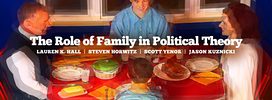In this response I want to tackle issues raised by all three of my colleagues. I want to try to answer Jason’s question about what moderated the family in a bit more depth than Lauren did in her reply, and then I want to use that answer to address the overarching theme of Scott’s response essay.
Lauren rightly points to a variety of economic considerations that helped moderate the patriarchy of the pre-modern family. I want to expand on those and connect them to the development of the companionate marriage. The key point of change was the emergence of capitalism in the late 18th and early 19th century. For most of prior human history, marriage and family for most people were narrowly economic institutions (except among the very wealthy, for whom they were more political than economic). Marriage was not about finding a soul-mate, but a partner in production. Whether it was agriculture or small crafts, or even early trade, the family was the site of economic production, and family members were much more like employees than they are today in the capitalist world. Marriage was about finding a partner whose human capital in production appropriately complemented your own in order to engage in the family business, most often agriculture.
The family’s status as production unit helps to understand the patriarchy. The father was, roughly, the owner and CEO, and family members were productive assets to be deployed as needed. Women and children worked the land or contributed in other ways, but under the direction of the father. He was not only, as Jason’s essay suggests, the political head of the household, he was effectively the owner and manager of its productive capacity as well.
As the expansion of markets brought more trade and the factory system brought more wage labor, the productive importance of the family declined. People began to work outside of the home, and the house shifted from a site of production to one of consumption. This change brought about a gradual shift in the nature of marriage. No longer was complementary production-oriented human capital key to a good marriage. Instead, people began to look for spouses with whom they had other sorts of complementarities, and many of those were increasingly about consumption and other activities that they both enjoyed. The love-based companionate marriage began to emerge, thanks to the change in economic institutions, and, in the words of Stephanie Coontz, love slowly conquered marriage.
At the same time, the way people talked about other people began to change. Liberalism in its classical form gave us a language of equality and increasing respect for the dignity of all human beings, as well as an aversion to coercion, that contributed to the emergence of what Deirdre McCloskey calls “the bourgeois virtues.” Those virtues were a contributing cause of the flowering of innovation and trade we call the Industrial Revolution, but they were also enhanced by it.
Together, the love-based marriage and the liberal “habits of the lip” associated with the bourgeois virtues moderated the power of the patriarchy. Marriages based on love provided women with the ability to call men on their abuses of power within the family, as did women’s ability to draw on the language of equality, especially by the start of the 20th century. As women also gained tangible political and economic rights, their ability to escape the patriarchy slowly began to increase, and that new bargaining power was a force of moderation as well. We see this reflected in late 19th century literature, where domestic violence against women was increasingly portrayed as morally unacceptable behavior.
Once the love-based marriage began to dominate, and the language of liberal equality began to expand, there was no going back. The 20th century saw market capitalism produce enormous wealth and a dramatic increase in female labor force participation, which accelerated the trends of the century prior and also gave us the advances in contraception that broke the link between marriage and procreation. The result of those changes is seen in the diversity of family forms we observe today. The most obvious example is the advent of legalized same-sex marriage, which is the unsurprising outcome of marriage and family having become almost completely about love and emotional satisfaction rather than production and reproduction.
The combination of structural economic change and a shift toward liberal respect for equality and human dignity makes these changes in marriage and family, in my view, irreversible. What counts as the moderation of families is not, as Scott charges, merely the result of the short-run whims of public opinion. In fact, that moderation has been driven by secular changes in economic and political institutions as well as fundamental belief systems. If one believes those changes have pointed us in the wrong direction, those are not ships that can be turned around easily, if at all.
I think that these changes in the family have been largely positive developments. The moderation of the family is a good thing for all the reasons Lauren discusses, and it has provided greater respect for the diversity of human relationships and more freedom to pursue those deeply meaningful life choices in the ways we see fit. It has also rescued women and children from the not normally benevolent despotism of the patriarchy. Capitalism and liberalism moderated the family and made it more humane. Why anyone would want to undo those changes remains a mystery to me.

